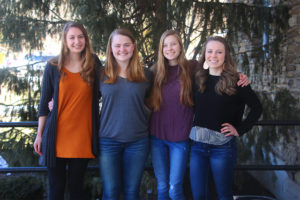Yesterday, a group of English and writing students embarked on a trip to Butler University’s Undergraduate Research Conference. The group will spend Friday at the conference before visiting the Calvin Festival of Faith and Writing on their way back to Houghton.
“I’m writing a paper centered around environmentalism in fiction,” said Sarah Vande Brake ’19, one of the presenting students. “I chose to focus on the writers Wendell Berry and Barbara Kingsolver, who both address serious environmental issues in their fiction. It’s also worth mentioning that they are both writing about the same geographical area—rural Appalachia—and how this landscape is changing as farming practices change. Berry and Kingsolver come to different conclusions about what it means to practice environmental responsibility, but they agree that radically inclusive communities are the place to start…their characters evaluate their actions differently than someone who only thinks about human communities.”

Membership does mean slightly different things to these writers because of the way they imagine ideal community structure. To Berry, it’s a rural farming community that uses traditional practices. To Kingsolver, it’s more flexible. Stewardship evolves depending on current scientific understanding and practical/local needs.
Berry defines membership in terms of tradition and experience because this gives his communities security. His characters can know that generations down the line will share the same purpose of promoting health for land and people.
“Berry might be more realistic about human nature, but he’s a lot less accessible in many ways,” Vande Brake continued. “Kingsolver’s membership is flexible and people can change the structure itself for the better. Her novel Prodigal Summer is interesting because of the ways it shows communities experiencing change. It’s a hopeful picture, if a little didactic.”
Rachel Zimmerman ’18 will present a paper on four of novels of Edith Wharton’s novels: The House of Mirth, Summer, Ethan Frome, and The Age of Innocence. “I’m looking at flawed and broken romantic relationships, particularly marriage,” Zimmerman said. “[Wharton] tends to portray them all as pretty hopeless, but with glimpses of stability and hope that are achievable.”
Zimmerman hopes to focus on the “way that novels and [Wharton’s] life interweave to reveal her vision of the potential for stability and hope in relationships.”
Colleagues Sarah Madden and Olivia Richardson will present, respectively, “The Dystopian Novel and Human Nature” and “Characterizing Evil Through Transformation in Milton’s and Lewis’s Fiction.”
Laurie Dashnau, professor of writing, has supervised the Undergraduate Research Conference groups for the past three years. “The greatest challenge for me has been to shift my thinking from that of a subject matter expert to serving as a mentor and professor and overseer, branching out into areas considerably beyond my expertise,” she shared. Dashnau has enjoyed “responding as a near novice reader and listener” to foundational academic texts, which she believes helps students “think about the intersection between graduate level work and audiences that have little to no familiarity with the material.”
Dashnau continued, saying that it was “extremely rewarding to see students devise their own syllabus and see how syllabus is constantly being shaped and reshaped.
Although textual analysis in the humanities is sometimes viewed as subordinate to scientific research, Dashnau lamented the “erosion of primary text research” in universities across the nation. “I’m particularly grateful that we’ve had these three years,” she added, “to think about undergraduate research on an even wider scale with students from across the country. The number of majors in English and writing is rapidly declining, and very few students outside emerging educators are making a commitment to these majors. It’s very easy to think about undergraduate research in the sciences, but research in writing and literature takes us back to the root of the word. As Zora Neale Hurston said, research is ‘poking and praying with purpose.’ It requires having an eye out for details that have been overlooked, or for an argumentative edge that hasn’t been fully explored.”
